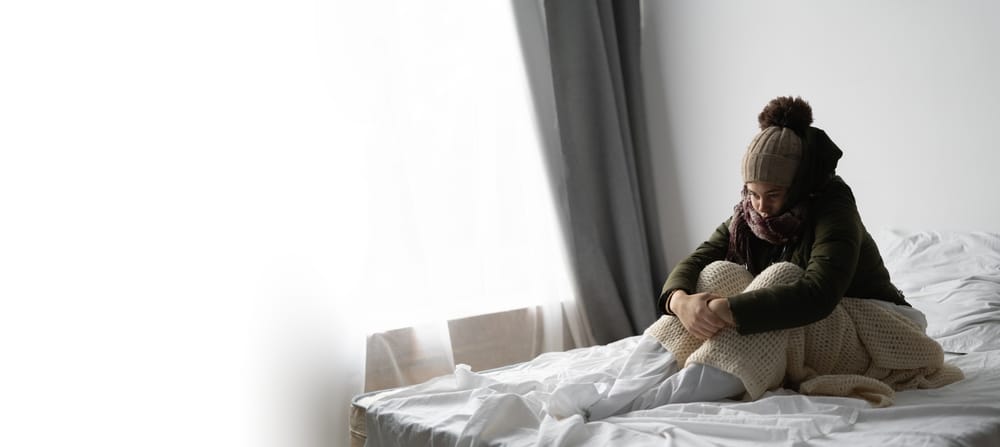Many of us are aware of how living in cold homes can affect our physical health, but it’s vital that we talk about the impact it has on our mental health, too
When it comes to considering the impact that cold weather, and being cold generally, have on us, it makes sense that our first thoughts may go to the physical impact. It’s well documented that living and working in cold environments can have an impact on our health, including respiratory disorders, cardiovascular diseases, and increased risk of strokes. But what about the impact on our mental health?
In a study published in Social Science & Medicine, researcher associate at the University of Essex Amy Clair and Professor of Housing Research at the University of Adelaide Emma Baker took data from Understanding Society (the UK Household Longitudinal Study) to track people’s housing experiences alongside their mental health. They also used questionnaires to explore perceptions of indoor temperature and gather information about people’s lives – such as their employment status, demographics, and finances. What they saw was that people who live in homes that they are unable to keep suitably warm (The World Health Organisation recommends a minimum indoor temperature of 18°C) reported reduced feelings of autonomy and control, an impact on their sleep, a reduction in social activities, and financial strain – all things the researchers highlighted as pathways that contribute to poorer mental health.
Other studies have found that people with pre-existing mental health conditions are thought to be more vulnerable to health problems associated with cold homes, and Clair and Baker’s study found something similar. They saw that the risk of living in a cold home was unevenly distributed – with lone parents, those with long-term illnesses, and those who are unemployed disproportionately likely to live in cold homes, leading them to write in a blog post: ‘The UKs sickest and most vulnerable tend to live in the housing most likely to make them sick.’
However, even after the researchers applied controlling for these factors, they still saw that the inability to keep a home warm is associated with a significant increase in the odds of reporting severe mental distress. And, for people who showed no mental distress on entry to the survey, their odds of reporting severe mental distress doubled if their home became too cold.

Similar links have been observed elsewhere, with a systematic literature review, ‘Cold homes and their association with health and well-being’, highlighting the important context of the rising cost of living and fuel poverty – the latter associated with an increased risk of suicide.
In light of their research, Amy Clair and Emma Baker make the call for policy intervention, suggesting improved energy efficiency in homes and greater financial support for those who are struggling – something they believe has the potential to reduce mental health problems, health inequalities, and health spending, as well as improve employment and productivity. They label living in cold homes as an ‘avoidable source of social harm’ that comes with significant health impacts. Across the UK, campaign groups such as National Energy Action and the End Fuel Poverty Coalition work to address these issues on a policy level, while also offering advice and support for those who are affected.
For many people, the choice between heating a home and putting food on the table is becoming a painfully familiar dilemma. The financial and health implications, combined with the unpleasant, draining sensation of being physically cold for an extended period of time, take its toll on our mental health and wellbeing – and we must keep talking about it. If you have been affected by the issue discussed here, there are many avenues of support available to you.
Where to get help
I can’t afford to heat my home
If you are unable to afford your energy bills, there are routes you can go down to access grants and benefits. Visit ofgem.gov.uk for a breakdown of the options available to you.
Crisis support
-
If you are in crisis and are concerned for your own safety, call 999, or go to A&E.
-
Call Samaritans on 116 123 or email them on jo@samaritans.org
Mental health support
If your mental health is impacting your day-to-day life, visit your GP to find out how best they can support you.
Head to the Happiful helpline page, to find a large collection of listing lines, text message support, and a wealth of resources on a range of mental health topics.
Warm spaces
Warm spaces are spaces in local communities that anyone can visit to be warm and safe in an open and non-judgemental environment. You can search for spaces near you by visiting warmwelcome.uk, or try asking around on local community social media pages.


Comments